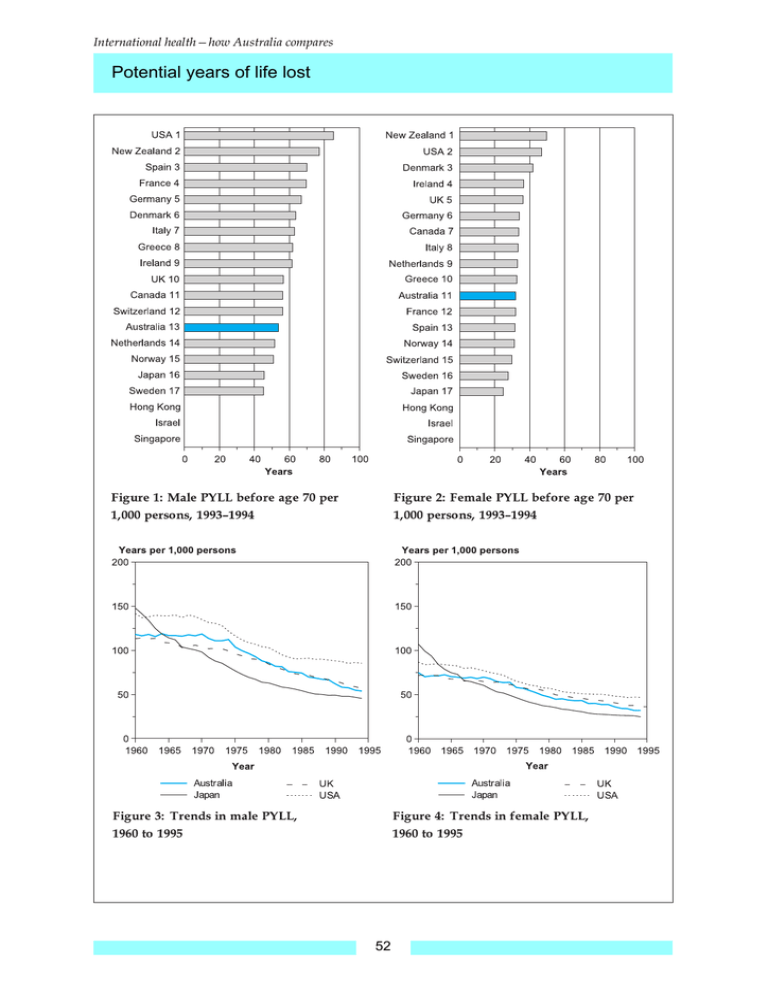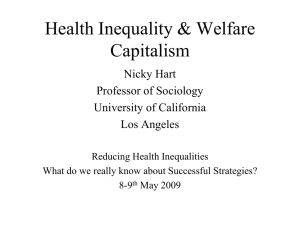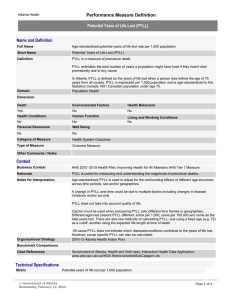Potential years of life lost
advertisement

International healthÑhow Australia compares Potential years of life lost 52 International healthÑhow Australia compares Potential years of life lost Potential years of life lost before age 70, by sex and major cause of death(a) (per 1,000 population) Males Females Country Year CVD Cancer External causes Australia Canada Denmark France Germany Greece Hong Kong Ireland Israel Italy Japan Netherlands New Zealand Norway Singapore Spain Sweden Switzerland UK USA 1994 1994 1993 1994 1996 1995 Ñ 1993 Ñ 1993 1994 1995 1995 1994 Ñ 1994 1995 1994 1995 1994 10.7 11.2 12.6 8.9 14.8 14.1 Ñ 18.4 Ñ 11.4 9.3 11.7 19.3 12.2 Ñ 11.5 11.1 9.6 15.3 17.6 13.5 12.9 14.8 19.0 15.7 14.2 Ñ 14.6 Ñ 16.3 12.7 13.7 16.9 12.0 Ñ 17.1 9.6 13.2 13.1 14.3 16.7 17.1 16.4 20.9 14.5 17.6 Ñ 15.1 Ñ 13.7 13.4 9.3 26.3 13.2 Ñ 16.2 12.6 20.1 11.5 25.8 All causes CVD Cancer External causes All causes 53.8 56.3 63.7 69.8 63.2 63.2 Ñ 61.6 Ñ 62.8 45.5 51.4 73.4 51.0 Ñ 70.1 43.0 56.2 56.9 85.2 4.1 4.4 5.6 3.0 5.7 4.9 Ñ 6.3 Ñ 4.7 4.2 5.0 7.7 4.3 Ñ 4.0 3.7 3.3 6.1 8.0 11.4 12.2 15.6 10.1 12.5 9.5 Ñ 13.7 Ñ 11.3 8.7 12.5 17.7 12.3 Ñ 10.1 10.5 10.2 13.1 12.4 5.3 5.7 6.8 6.9 4.5 4.7 Ñ 4.0 Ñ 3.7 4.7 3.6 8.6 4.4 Ñ 4.1 4.7 6.8 3.5 8.2 31.9 33.7 41.7 31.7 32.7 31.6 Ñ 36.5 Ñ 33.4 24.7 32.6 47.7 31.1 Ñ 31.5 26.3 30.0 36.2 46.7 (a) Excludes suicide. Source: OECD 1998. of death as motor vehicle accidents, accidental falls and homicide. ¥ Australian PYLL values have exhibited a steady decline since 1970, showing trends similar to those observed in the United Kingdom and the United States. Japanese PYLL, in contrast, have shown a decline from a much earlier date (Figures 3 and 4). These reductions in premature mortality can be attributed to factors such as advances in medical technologies (e.g. cardiovascular therapies) and health policy or social programme interventions in particular areas such as perinatal health. ¥ The PYLL measure is strongly influenced by death rates in every stage of life. Other composite measures of health status such as disability-adjusted life years (DALYs) and disability-free life expectancy (DFLE) are therefore receiving increasing prominence. These measures combine information not only on the length of life, but also on quality of life, and may encompass morbidity, disability and mortality outcomes. ¥ Potential years of life lost (PYLL) is an indicator of premature or untimely death. If dying before the age of 70 is considered premature, then a person dying at age 55 would have lost 15 years of potential life. On this score, a particular countryÕs PYLL value will be higher if mortality among children or young people is high. Conditions such as birth defects, injuries and AIDS are significant contributors to PYLL values. Chronic diseases causing death among the elderly, on the other hand, have little effect on these values. ¥ Japan, Sweden and Norway had low PYLL values for both males and females during 1993 or 1994, whereas the United States and New Zealand had the highest values for both sexes (Figures 1 and 2), attributable to comparatively higher infant death rates. France and Spain showed high male PYLL valuesÑclose to 70 years per 1,000 population. France and Spain also had male:female PYLL ratios in excess of 2.0, the male PYLL value being more than double the female value. ¥ The Australian male rate of 53.8 years, and female rate of 31.9 years per 1,000 population in 1994 compare well with other developed countries. For the ÔexternalÕ cause of death subgroup, however, 10 countries performed better than Australia for both males and females. This subgroup includes such causes For more information, see: OECD 1993. OECD health systems: facts and trends 1960Ð1991. OECD Health Policy Studies No. 3. Paris: OECD. 53



